Politics
India’s pollution refugees fleeing Delhi’s toxic air
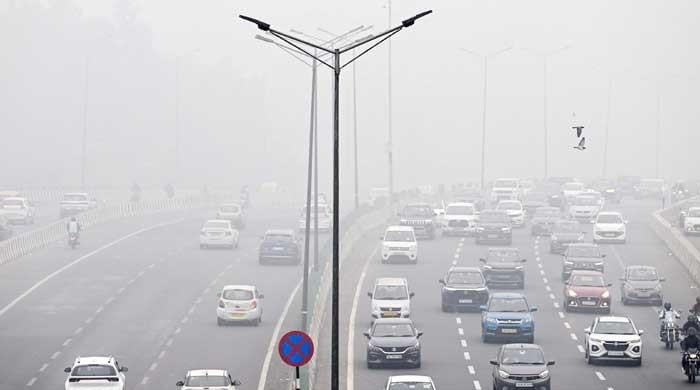
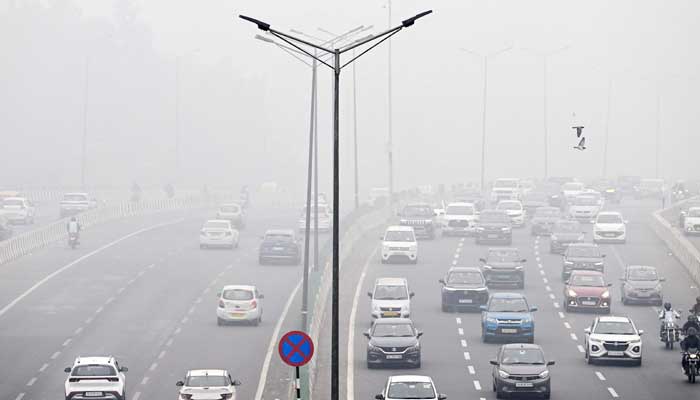
- Families leaving Delhi because of health risks linked to air pollution.
- Levels of cancer causing PM2.5 surge 60 times of WHO limits.
- 3.8m deaths in India from 2009 to 2019 linked to air pollution: study
BENGALURU: Pollution levels in India’s capital shaped Natasha Uppal and her husband’s decision on parenthood — either raise their child away from the city, or stay put and remain childless.
New Delhi and the surrounding metropolitan area, home to more than 30 million people, consistently tops world rankings for air pollution.
Uppal, who grew up in the city, often considered leaving — especially on days spent indoors with air purifiers humming, or when she battled severe migraines.
The turning point came when the couple decided to try for a baby.
“When we thought about what we can curate for our child in Delhi,” she told AFP, “the air just became such a blocker for so many of those things”.
In 2022, they relocated to Bengaluru and, days later, she discovered she was pregnant.
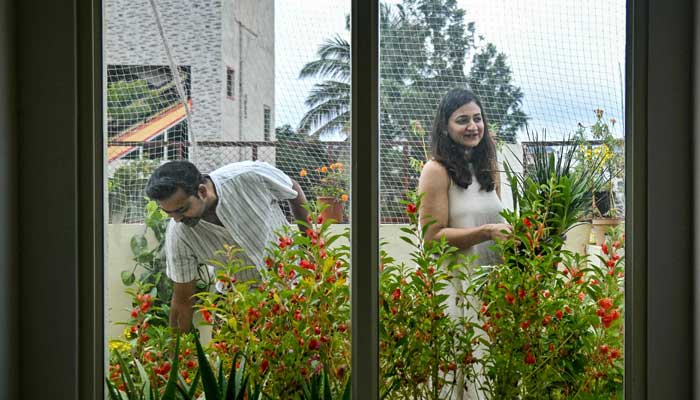
They are among a small but growing number of families leaving Delhi because of health risks linked to air pollution.
Uppal, the 36-year-old founder of maternal health support group Matrescence India, said leaving was the “best decision”.
Air pollution in Bengaluru can still sometimes hit three times World Health Organisation (WHO) limits.
But that is far below Delhi’s months-long haze — and means her son “is in and out of the house as many times as he likes”.
Clean air is “something that is a basic human right”, she said. “Everyone should be able to take [it] for granted”.
3.8 million deaths
Each winter, Delhi is blanketed in acrid smog, a toxic mix of crop-burning, factory emissions and choking traffic.
Levels of PM2.5 — cancer-causing microparticles small enough to enter the bloodstream — have surged to as much as 60 times WHO limits.
Despite pledges of reform, measures such as partial vehicle bans or water trucks spraying mist have done little to clear the air.
This year, authorities promise cloud-seeding trials to cut pollution.
A study in The Lancet Planetary Health last year estimated 3.8 million deaths in India between 2009 and 2019 were linked to air pollution.
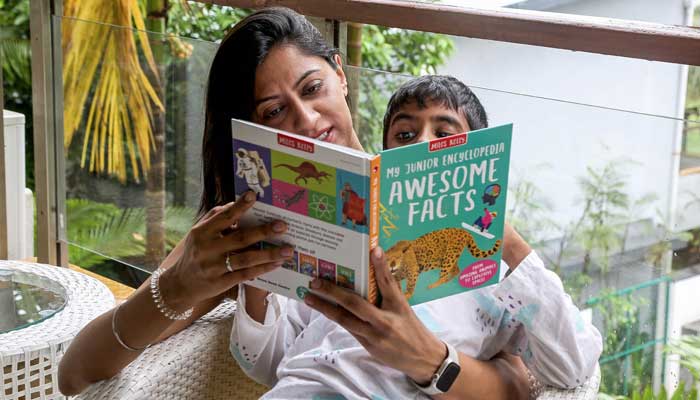
The UN children’s agency warns that polluted air puts children at heightened risk of acute respiratory infections.
For Vidushi Malhotra, 36, the breaking point came in 2020 as her two-year-old son fell ill repeatedly.
“We had three air purifiers running continuously, and then I needed more,” she said.
A year later, Malhotra, her husband and son moved to Goa. She urged friends to follow, starting what she calls a “mini-movement”. A few did.
“I have to keep going back and see my loved ones go through this,” she added. “That really makes me sad.”
Nebulisers, inhalers
Others, like Delhi resident Roli Shrivastava, remain but live in constant anxiety.
The 34-year-old keeps inhalers for her smoke allegies and nebulisers ready for her toddler, whose cough worsens each winter.
“The doctor told us winter will be difficult,” she said. “He just told us, ‘When your kid starts coughing at night, don’t even call me — just start nebulising’.”
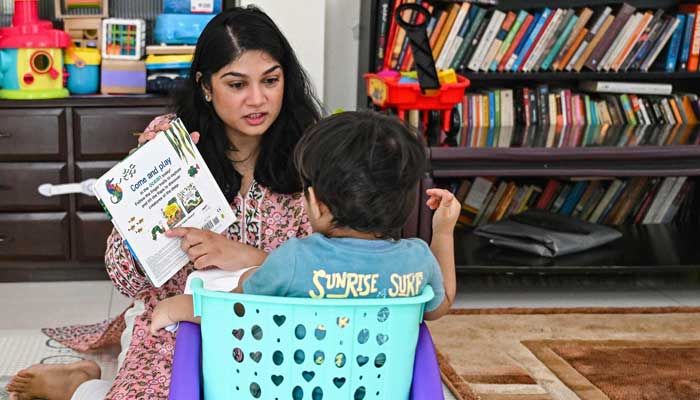
As winter nears, Shrivastava is preparing for another season indoors — restricting outdoor play for her son, running air purifiers and checking air quality daily.
When the family visits relatives in the southern city of Chennai, her son’s health improves “drastically”.
“His nose stops running, his cough goes away,” she said.
Shrivastava and her husband, who both work with a global advocacy group, say they would have left Delhi long ago if not for the “jobs we love and the opportunities”.
Relocation, she admits, is never far from their minds.
“I don’t think at the rate it’s going, Delhi is a good place to raise kids — when it comes to air pollution at least.”
Politics
Trump announces 10% tariffs on eight European nations over Greenland

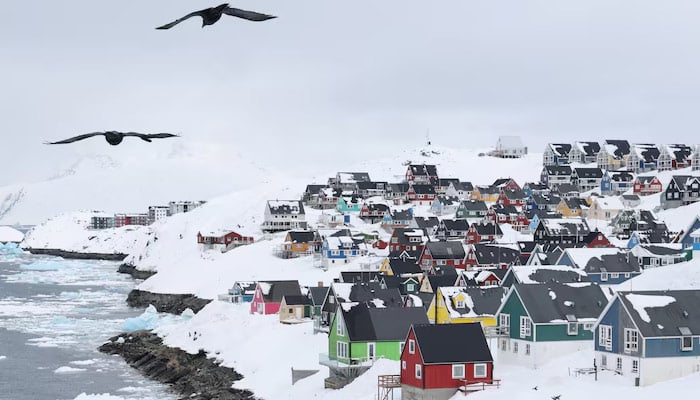
- Tariffs will stay until US buys Greenland: Trump.
- European nations reiterate support for Denmark.
- UK PM Starmer terms US move “completely wrong”.
US President Donald Trump on Saturday vowed to implement a wave of increasing tariffs on European allies until the Washington is allowed to buy Greenland, escalating a row over the future of Denmark’s vast Arctic island.
In a post on Truth Social, Trump said that an additional 10% import tariffs would take effect on February 1 on goods from Denmark, Norway, Sweden, France, Germany, the Netherlands, Finland and Great Britain — all already subject to tariffs imposed by Trump.
Those tariffs would increase to 25% on June 1 and would continue until a deal was reached for the US to purchase Greenland, Trump wrote.
Trump has repeatedly insisted he will settle for nothing less than ownership of Greenland, an autonomous territory of Denmark. Leaders of both Denmark and Greenland have insisted the island is not for sale and does not want to be part of the US.
Security, minerals
The president has repeatedly said Greenland is vital to US security because of its strategic location and large mineral deposits, and has not ruled out using force to take it. European nations this week sent military personnel to the island at Denmark’s request.
“These Countries, who are playing this very dangerous game, have put a level of risk in play that is not tenable or sustainable,” Trump wrote.
Protesters in Denmark and Greenland demonstrated on Saturday against Trump’s demands and called for the territory to be left to determine its own future.
The countries named by Trump on Saturday have backed Denmark, warning that the US military seizure of a territory in NATO could collapse the military alliance that Washington leads.
“The president’s announcement comes as a surprise,” Denmark’s Foreign Minister Lars Lokke Rasmussen said in a statement.
British Prime Minister Keir Starmer was unusually blunt in condemning Trump’s threat, saying on X that his country would raise the issue directly with Washington.
“Applying tariffs on allies for pursuing the collective security of Nato allies is completely wrong,” Starmer said.
European Commission President Ursula von der Leyen and European Council President Antonio Costa said in separate but identical posts on X that the European Union stood in “full solidarity” with Denmark and Greenland.
“Tariffs would undermine transatlantic relations and risk a dangerous downward spiral. Europe will remain united, coordinated, and committed to upholding its sovereignty,” they said.
Officials from Norway, Sweden, France and Germany reiterated support for Denmark on Saturday and said tariffs should not be part of Greenland discussions.
Cyprus, which currently holds the EU presidency, said it has called for an emergency meeting of ambassadors from the union’s 27 countries on Sunday.
Trade deals under threat?
Saturday’s threat could derail tentative deals Trump struck last year with the European Union and Great Britain. The deals included baseline levies of 15% on imports from Europe and 10% on most British goods.
“The biggest danger, it seems to me, is his decision to treat some EU countries differently from others,” said William Reinsch, a trade expert at the Centre for Strategic and International Studies. “I’m not surprised [….] It may well convince the European Parliament that it is pointless to approve the trade agreement with the US, since Trump is already bypassing it.”
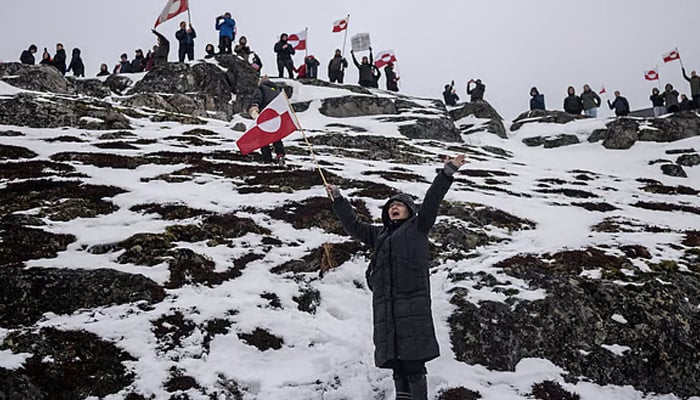
Trump floated the general idea of tariffs over Greenland on Friday, without citing a legal basis for doing so. Tariffs have become his weapon of choice in seeking to compel American adversaries and allies alike to meet his demands.
He said this week he would put 25% tariffs on any country trading with Iran as that country suppressed anti-government protests, though there has been no official documentation from the White House of the policy on its website, nor information about the legal authority Trump would use.
The US Supreme Court has heard arguments on the legality of Trump’s sweeping tariffs, and any decision by the top US judicial body would have major implications on the global economy and US presidential powers.
The encroaching presence of China and Russia makes Greenland vital to US security interests, Trump has said. Danish and other European officials have pointed out that Greenland is already covered by NATO’s collective security pact.
A US military base, Pituffik Space Base, is already in Greenland, with around 200 personnel, and a 1951 agreement allows the US to deploy as many forces as it wants in the Danish territory.
That has led many European officials to conclude that Trump is motivated more by a desire to expand US territory than by security concerns.
“China and Russia must be having a field day. They are the ones who benefit from divisions among allies,” EU foreign policy chief Kaja Kallas said on X in response to Trump’s threat.
Some US senators also pushed back. “Continuing down this path is bad for America, bad for American businesses and bad for America’s allies,” Senators Jeanne Shaheen and Thom Tillis, bipartisan co-chairs of the Senate Nato Observer Group, said in a statement.
Europeans should not react hastily to Trump’s tariff threat, said Carsten Brzeski, global head of macro at ING Research.
“Just ignore it and wait and see,” Brzeski told Reuters. “Europe has shown that it will not accept everything, and so the tariffs are actually already a step forward compared to the threatened military invasion.”
Politics
Indonesian authorities find wreckage of missing surveillance plane with 11 on board
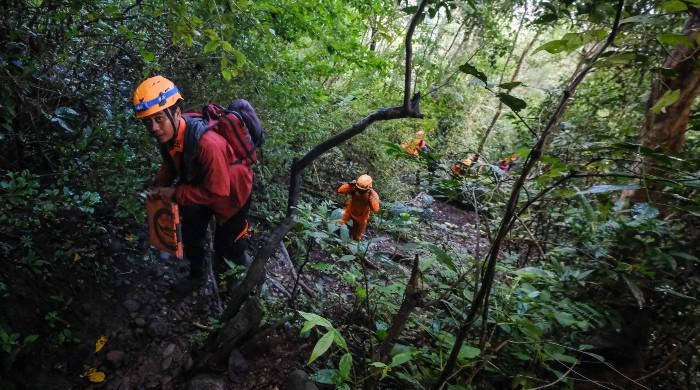
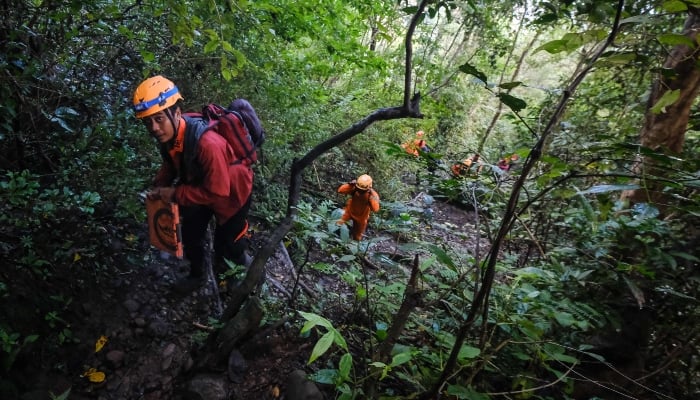
- Eight crew members and three passengers were onboard.
- Plane was chartered for fisheries surveillance operations.
- Debris found around Mount Bulusaraung amid heavy fog.
Indonesian authorities said on Sunday they had located the wreckage of a fisheries surveillance plane that went missing in South Sulawesi province near a fog-covered mountain, but were still searching for the 11 people on board.
The ATR 42-500 turboprop owned by aviation group Indonesia Air Transport lost contact with air traffic control on Saturday at about 1:30pm local time (0530 GMT) around the Maros region in South Sulawesi.
There were eight crew members and three passengers on board the plane, which was chartered by Indonesia’s Marine Affairs and Fisheries Ministry to conduct air surveillance on fisheries. The passengers were ministry staff members.
The head of South Sulawesi’s rescue agency, Muhammad Arif Anwar, said on local television that after finding the wreckage, the rescuers would deploy 1,200 personnel to search for the missing passengers and crew.
“Our priority is to search for the victims, and we hope that there are some that we can evacuate safely,” he said.
The aircraft had been heading to Makassar, the capital of South Sulawesi, after departing from Yogyakarta province, before contact was lost.
On Sunday morning, local rescuers found the wreckage in different locations around Mount Bulusaraung in the Maros region, said Andi Sultan, an official at South Sulawesi’s rescue agency. The mountain is roughly 1,500 km (930 miles) northeast of the sprawling island nation’s capital, Jakarta.
“Our helicopter crews have seen the debris of the plane’s window at 7:46am,” Sultan told reporters.
“And around 7:49am, we discovered large parts of the aircraft, suspected to be the fuselage of the plane,” he said, adding the tail of the plane was also seen at the bottom of the mountain slope.
Rescuers have been deployed to the locations where the wreckage was discovered, Sultan said, adding the search was hampered by thick fog and mountainous terrain.
In video footage shared by the rescue agency, a window of the plane was found scattered on the mountain with thick fog and strong wind around it.
Sultan said Indonesia’s National Transportation Safety Committee would lead an investigation into the crash. The cause remains unclear, and experts say most accidents are caused by a combination of factors.
The ATR 42‑500, manufactured by Franco-Italian planemaker ATR, is a regional turboprop aircraft capable of carrying between 42 and 50 passengers.
Flight tracking website Flightradar24 said on X that the plane was flying over the ocean at a low altitude so its tracking coverage was limited, and the last signal was received at 0420 GMT about 20 km northeast of Makassar airport.
Politics
Trump invites more leaders to join Gaza ‘Board of Peace’
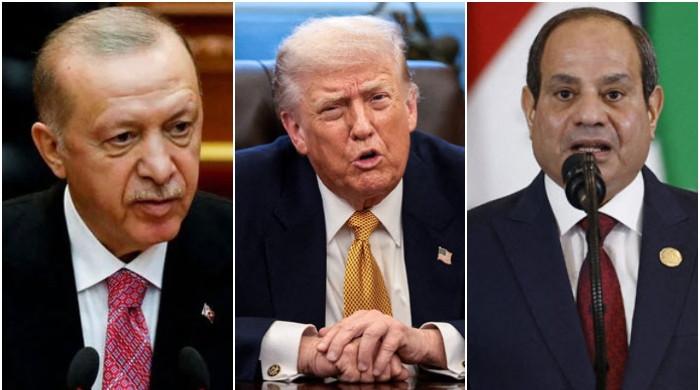
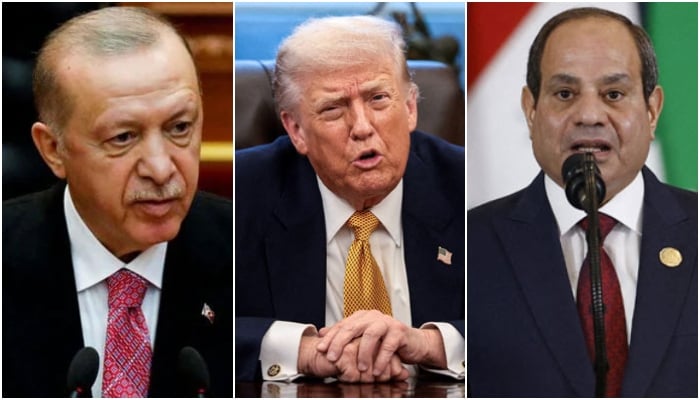
- Cairo “studying” request for Sisi to join board, says FM.
- Canadian PM intends to accept Trump’s invitation: aide.
- Argentine president says it will be an ‘honour’ to join initiative.
WASHINGTON: US President Donald Trump’s so-called “Board of Peace” for postwar Gaza began to take shape Saturday, with the leaders of Egypt, Turkey, Argentina and Canada asked to join.
The announcements from those leaders came after the US president named his Secretary of State Marco Rubio, former British prime minister Tony Blair, and senior negotiators Jared Kushner and Steve Witkoff to the panel.
Trump had already declared himself the chair of the body, as he promotes a controversial vision of economic development in the Palestinian territory, which lies in rubble after two-plus years of relentless Israeli bombardment.
The moves came after a Palestinian committee of technocrats meant to govern Gaza held its first meeting in Cairo which was attended by Kushner, Trump’s son-in-law who has partnered with Witkoff for months on the issue.
In Canada, a senior aide to Prime Minister Mark Carney said he intended to accept Trump’s invitation, while in Turkey, a spokesman for President Recep Tayyip Erdogan said he had been asked to become a “founding member” of the board.
Egypt’s Foreign Minister Badr Abdelatty said Cairo was “studying” a request for President Abdel Fattah al-Sisi to join.
Sharing an image of the invitation letter, Argentine President Javier Milei wrote on X that it would be “an honour” to participate in the initiative.
In a statement sent to AFP, Blair said: “I thank President Trump for his leadership in establishing the Board of Peace and am honoured to be appointed to its Executive Board.”
Blair is a controversial figure in the Middle East because of his role in the 2003 invasion of Iraq. Trump himself said last year that he wanted to make sure Blair was an “acceptable choice to everybody.”
Blair spent years focused on the Israeli-Palestinian issue as representative of the “Middle East Quartet” – the United Nations, European Union, United States and Russia – after leaving Downing Street in 2007.
The White House said the Board of Peace will take on issues such as “governance capacity-building, regional relations, reconstruction, investment attraction, large-scale funding and capital mobilisation.”
The other members of the board so far are World Bank President Ajay Banga, an Indian-born American businessman; billionaire US financier Marc Rowan; and Robert Gabriel, a loyal Trump aide who serves on the US National Security Council.
Trump has created a second “Gaza executive board” that appears designed to have a more advisory role.
It was not immediately clear which world leaders were asked to be on each board.
The White House, which said Friday that additional members would be named to both entities, did not immediately reply to a request for comment.
Israel strikes
Washington has said the Gaza plan had gone on to a second phase – from implementing the ceasefire to disarming Hamas, whose October 2023 attack on Israel prompted the massive Israeli offensive.
On Friday, Trump named US Major General Jasper Jeffers to head the International Stabilization Force, which will be tasked with providing security in Gaza and training a new police force to succeed Hamas.
Jeffers, from special operations in US Central Command, in late 2024 was put in charge of monitoring a ceasefire between Lebanon and Israel, which has continued periodic strikes aimed at Hezbollah.
Gaza native and former Palestinian Authority deputy minister Ali Shaath was earlier tapped to head the governing committee.
Trump, a real estate developer, has previously mused about turning devastated Gaza into a Riviera-style area of resorts, although he has backed away from calls to forcibly displace the population.
-

 Tech5 days ago
Tech5 days agoNew Proposed Legislation Would Let Self-Driving Cars Operate in New York State
-

 Sports1 week ago
Sports1 week agoClock is ticking for Frank at Spurs, with dwindling evidence he deserves extra time
-
Sports1 week ago
Commanders go young, promote David Blough to be offensive coordinator
-

 Entertainment5 days ago
Entertainment5 days agoX (formerly Twitter) recovers after brief global outage affects thousands
-

 Fashion1 week ago
Fashion1 week agoSouth India cotton yarn gains but market unease over US tariff fears
-

 Fashion1 week ago
Fashion1 week agoChina’s central bank conducts $157-bn outright reverse repo operation
-

 Business1 week ago
Business1 week agoSoftBank reduces Ola Electric stake to 13.5% from 15.6% – The Times of India
-

 Sports1 week ago
Sports1 week agoUS figure skating power couple makes history with record breaking seventh national championship






